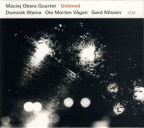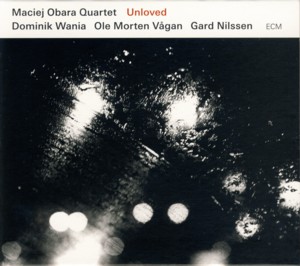Record Reviews
1 Review Found. Use search to find more reviews or follow the links in the review text.
  | MACIEJ OBARA ~ UNLOVED
ECM 2573 (Barcode: 602557645620) ~ POLAND ~ Jazz
Recorded: 2017 Released: 2017
This is the fourth album by the Polish Jazz saxophonist / composer Maciej ObaraFind albums by this artist and his international quartet, which also features Polish pianist Dominik WaniaFind albums by this artist and Norwegian rhythm section: bassist Ole Morten VaganFind albums by this artist and drummer Gard NilssenFind albums by this artist. It is the first studio recording by the quartet, as the three previous albums, all released on the Polish For TuneFind albums on this label label, were live recordings. It is of course also the first album by the quartet released on the German ECMFind albums on this label label. The album presents seven tracks, six of which are original compositions by Obara and one (the title track) is a relatively infrequently recorded composition by the Godfather of Polish Jazz, Krzysztof KomedaFind albums by this artist. The music was recorded at the legendary Rainbow Studio in Oslo with Jan Erik KongshaugFind albums by this artist in charge of the sonic quality.
Obara´s numerous earlier recordings, including the three albums with the quartet present here, established his position on the Polish Jazz scene as a restless explorer, a rebel and a fearless avant-gardist, who constantly pushed the borders of contemporary Polish / European Jazz. These recordings were uncompromising, adventurous, soaked in free-form and Avant-Garde expressionism, and yet deeply rooted in the Jazz idiom´s tradition.
The fact that this is a studio recording, as already mentioned above, and taking into account the decisive role of Manfred EicherFind albums by this artist, ECM´s supreme boss, who assumed the role of "musical producer" on this album, were obviously bound to have an effect on the outcome, but probably nobody could have imagined how dramatic the transformation was about to become.
The album is clearly divided into two sections (sort of A / B sides of an LP), with the first section (first four tunes) presenting deeply melancholic and introvert music, nicely rounded melodically and harmonically, but alas somewhat pale and monotonous, and the second part (last three tunes) being more ambitious and vibrant, but still not up to par with Obara´s earlier recordings. Gone is the fire and brimstone and the Obara heard on this album is all gentleness and sweetness, delicately uttering lovable notes, who seems to have lost completely the identity he worked for years to establish. Is this the next stage of development for Obara and his quartet? Quite possibly, but his old identity will be sadly missed.
But not everything is lost as far as this album is concerned. Wania manages to escape unspoiled and his work here is as brilliant as always, pure genius in fact. When he solos the music suddenly comes alive and sparks are flying. His brief interludes move elegantly into free-form, albeit briefly, finding the way back within a few bars. In many respects this album is as much Wania´s triumph as it is Obara´s underachievement. Sadly Wania´s brilliant work is not enough to save the album from the lethargic flow of "nice notes". The rhythm section is also excellent proving that playing in a much more relaxed environment is still within their capability and can be done intelligently and excitingly. And of course the sound quality is as heavenly as one might expect.
I am deeply saddened by the fact that this, obviously flagship recording by Obara, turned out to be less than I´d have hoped for. I can only hope that everything will turn for the better in the future.
Side Note: I have to admit that I was completely and utterly flabbergasted by the mass hysteria on the Polish Jazz scene surrounding the fact that this album was released on ECM. It is true that Obara is only the third Polish Jazz leader to have his album released by ECM (preceded by Tomasz StankoFind albums by this artist and Marcin WasilewskiFind albums by this artist), but what does it really mean?
Firstly it means that Manfred Eicher is simply not familiar enough with the burgeoning Polish Jazz scene and its world class talented musicians. If he was familiar with them, he would have surely invited some of them to record for his label, especially in view of the fact that dozens of Polish Jazz albums released by small independent Polish labels are way more interesting and meaningful than most of ECM releases in the last couple of decades.
Secondly it means that ECM is still considered by many people as a leading recording label, whereas in fact it lost its legendary status and influence many years ago. As pioneering and groundbreaking as the label was in the first couple of decades of its existence, bringing up scores of Jazz musicians to the attention of music connoisseurs, the label´s impact and leadership vastly diminished in time. Just ask yourself how many albums in the ECM catalogue do you know / own that were recorded in the 1970s / 1980s and how many albums you know / own that were recorded since 2000? Do the same with a list of recording artists who released albums on ECM in these two periods? The statistics are abundantly clear.
And lastly it means that Polish Jazz scene is completely consumed with the inferiority complex that has always haunted it, looking somewhere else for excellence and example rather than paying tribute to its own Artists and showing them the appreciation they really deserve. Many Polish Jazz fans are still convinced that only Afro-American musicians can play Jazz and everything happening at home is secondary and meaningless, whereas in fact that is completely contrary to the truth.
| | Updated: 12/04/2019Posted: 30/11/2017 | CD 1 Slipcase Recommend To A Friend |
|







